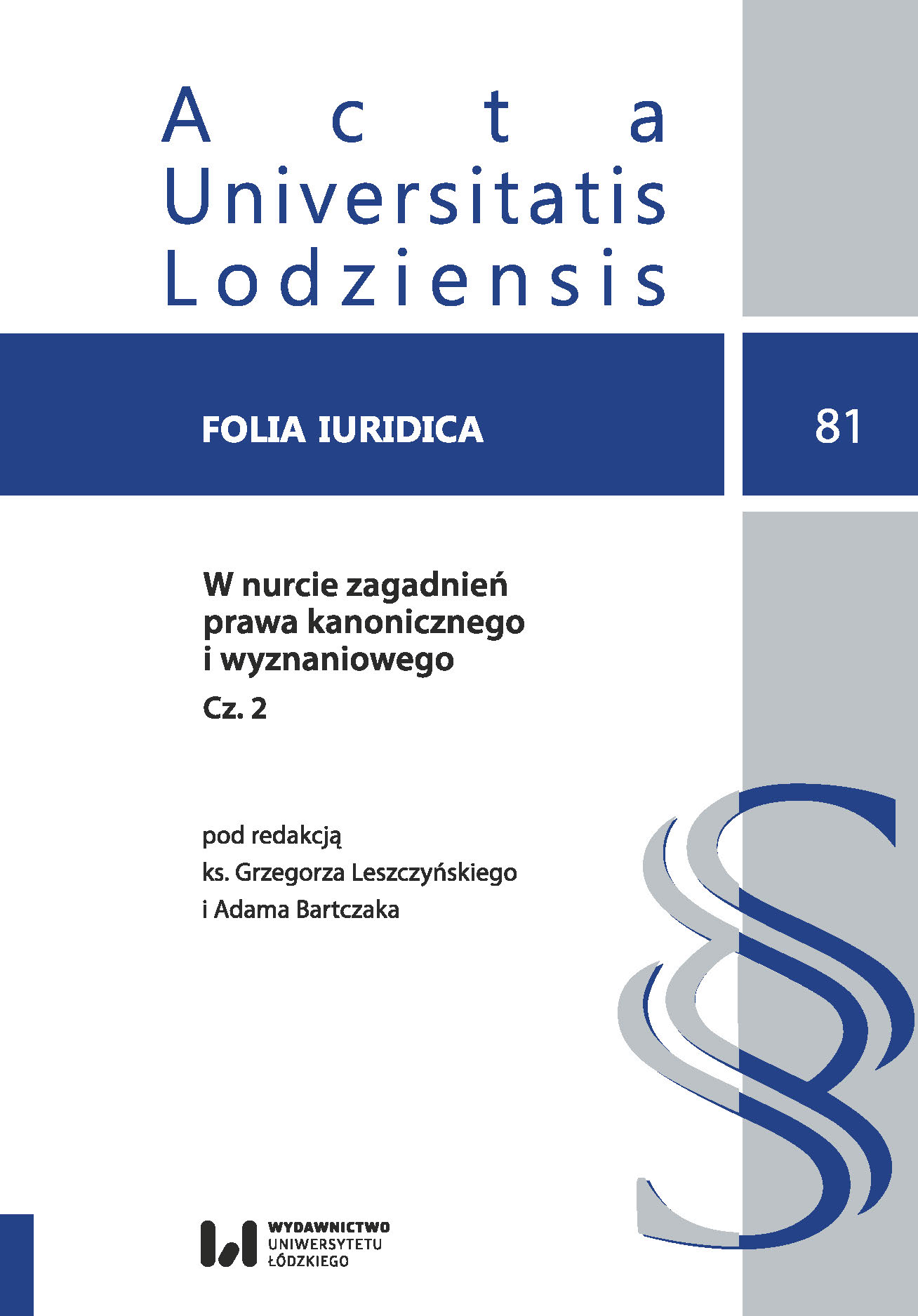Naturalizacja prawa kanonicznego w optyce prawodawczej
DOI:
https://doi.org/10.18778/0208-6069.81.02Słowa kluczowe:
naturalizacja prawa, prawo kanoniczne, prawodawstwo, Kościół katolicki, ustawodawcaAbstrakt
Obecnie toczy się dyskusja na temat naturalizacji prawa – celów, koncepcji, modeli, efektów tego zjawiska. Z tego powodu, że prawo Kościoła katolickiego jest prawdziwym prawem, wspomniana dyskusja może być przeniesiona na obszar tego właśnie prawa. W związku z tym można sformułować następujący problem zawarty w pytaniach: czy jest możliwa naturalizacja prawa kanonicznego, a jeżeli tak, to w jaki sposób ta naturalizacja miałaby przebiegać? Niniejszy artykuł jest skromną próbą zaprezentowania zagadnienia naturalizacji prawa w kontekście prawa kanonicznego. Jako pierwsze zostało pokazane prawo kanoniczne jako zjawisko naturalne i jako zjawisko, które można „unaturalnić”. Następnie zostały zademonstrowane przykłady naturalizacji sensu largo i sensu stricto. Ostatnia część artykułu zawiera kilka wskazówek i zasad istotnych dla procesu naturalizacji prawa kanonicznego. Wniosek jest następujący: naturalizacja musi być zauważona przez prawodawcę kościelnego, lecz naturalizacja prawa kanonicznego powinna być dokonywana w ograniczony sposób w zgodzie i z poszanowaniem dla specyficznych cech prawa kanonicznego.
Pobrania
Bibliografia
Benedict PP. XV. 1917. „Codex Iuris Canonici Pii X Pontificis Maximi iussu digestus, Benedicti Papae XV auctoritate promulgatus”. Acta Apostolicae Sedis 9 (2): 11–456.
Google Scholar
Birnbacher, Dieter. 2008. “Posthumanity, Transhumanism and Human Nature”. W Medical enhancement and posthumanity. Red. Bert Gordijn, Chadwick F. Ruth. 95–106. Dordrecht: Springer.
Google Scholar
Brożek, Bogdan. 2015. „O naturalizacji prawa”. W Naturalizm prawniczy: interpretacje. Red. Jerzy Stelmach, Bartosz Brożek, Łukasz Kurek, Katarzyna Eliasz. 24–47. Warszawa: Wolters Kluwer.
Google Scholar
Burke, Cormac. 1996. “Renewal, Personalism and Law”. Forum 7: 327–340.
Google Scholar
Churchland, Patricia S., Mateusz Hohol, Natalia Marek. 2013. Moralność mózgu: co neuronauka mówi o moralności. Kraków: Copernicus Center Press.
Google Scholar
Ciceron. 2016. De legibus, De officiis, De finibus. http://www.thelatinlibrary.com/cic.html [dostęp 14.04.2016].
Google Scholar
Huels, John M. 1997. “Interpreting Canon Law in Diverse Cultures”. The Jurist 47: 249–293.
Google Scholar
Ioannes Paulus PP. II. 1983. „Codex Iuris Canonici”. Acta Apostolicae Sedis 75 (II): 1–301. Tekst polski: Kodeks Prawa Kanonicznego. Przekład zatwierdzony przez Konferencję Episkopatu Polski. Poznań: Pallottinum.
Google Scholar
Ioannes Paulus PP. II. 1992. „Adhortatio apostolica postsynodalis Pastores dabo vobis de Sacerdotum formatione in aetatis nostrae rerum condicione”. Acta Apostolicae Sedis 84: 657–804. Tekst polski: Posynodalna adhortacja apostolska „Pastores dabo vobis” Ojca Świętego Jana Pawła II do biskupów, do duchowieństwa i wiernych o formacji kapłanów we współczesnym świecie. Wrocław: Wydawnictwo Wrocławskiej Księgarni Archidiecezjalnej TUM.
Google Scholar
Jakubiec, Marek. 2014. „O relacji pomiędzy filozofią nauki a jurysprudencją w świetle problematyki naturalizacji prawa”. Logos i Ethos 2: 137–152.
Google Scholar
Katechizm Kościoła Katolickiego. 2002. Poznań: Pallottinum.
Google Scholar
Kroczek, Piotr. 2005. „Problem interpretacji prawa kanonicznego w świetle pluralizmu kulturowego”. Analecta Cracoviensia 37: 509–516.
Google Scholar
Kroczek, Piotr. 2011. „Prawo we wspólnocie Kościoła”. W Wspólnoty opisane. Zjawisko wspólnotowości w perspektywie interdyscyplinarnej. Red. M. Kopczyk. 53–62. Bielsko-Biała: Wydawnictwo Naukowe Akademii Techniczno-Humanistycznej.
Google Scholar
Kroczek, Piotr. 2012. The art of legislation: the principles of lawgiving in the Church. Kraków: Unum Publishing House.
Google Scholar
Kroczek, Piotr. 2013a. „Teologiczne podstawy reguł sensu czynności konwencjonalnych i norm kompetencyjnych w prawie kanonicznym i ich konsekwencje dla decyzji prawodawczych”. Annales Canonici 9: 55–73.
Google Scholar
Kroczek, Piotr. 2013b. Wychowanie: optyka prawa polskiego i prawa kanonicznego. Kraków: Wydawnictwo Naukowe Uniwersytetu Papieskiego Jana Pawła II.
Google Scholar
Kroczek, Piotr. 2014. „Ius sequitur vitam, czyli o niektórych czynnikach zmian w prawie”. Studia Socialia Cracoviensia 6: 163–176.
Google Scholar
Łuszczyńska, Małgorzata. 2006. „Prawo natury a prawo stanowione – dwa antagonistyczne ujęcia filozofii prawa”. Annales Universitatis Mariae Curie-Skłodowska. Sectio G. Ius 52/53: 87–108.
Google Scholar
Örsy, Ladislas M. 1980. “The Interpreter and His Art”. The Jurist 40: 27–56.
Google Scholar
Örsy, Ladislas M. 1992. Theology and Canon Law: new horizons for legislation and interpretation. Collegeville: Liturgical Press.
Google Scholar
Palmer, Paul F. 1981. „Konieczność teologii małżeństwa”. Communio. Międzynarodowy Przegląd Teologiczny 5: 13–31.
Google Scholar
Podsiad, Antoni. 2000. Słownik terminów i pojęć filozoficznych. Warszawa: Instytut Wydawniczy „Pax”.
Google Scholar
Rozporządzenie Ministra Nauki i Szkolnictwa Wyższego z dnia 8 sierpnia 2011 r. w sprawie obszarów wiedzy, dziedzin nauki i sztuki oraz dyscyplin naukowych i artystycznych, Dz. U. 2011, Nr 179, poz. 1065.
Google Scholar
Sacrosanctum Concilium Oecumenicum Vaticanum II. 1965. „Constitutio dogmatica Lumen gentium de Ecclesia”. Acta Apostolicae Sedis 57 (1): 5–75. Tekst polski: Sobór Watykański II. 2008a. Konstytucja dogmatyczna o kościele „Lumen gentium”. Poznań: Pallottinum.
Google Scholar
Sacrosanctum Concilium Oecumenicum Vaticanum II. 1966a. „Declaratio Gravissimum educationis de educatione Christiana”. Acta Apostolice Sedis 58: 728–739. Tekst polski: Sobór Watykański II. 2008b. Gravissimum educationis. Deklaracja o wychowaniu chrześcijańskim. Poznań: Pallottinum.
Google Scholar
Sacrosanctum Concilium Oecumenicum Vaticanum II. 1966b. „Decretum Optatam totius de institutione sacerdotali”. Acta Apostolice Sedis 58: 713–727. Tekst polski: Sobór Watykański II. 2008c. Dekret o formacji kapłańskiej „Optatam totius”. Poznań: Pallottinum.
Google Scholar
Sobański Remigiusz. 1978a. „Ustawa kościelna – ordinatio rationis czy ordinatio fidei?”. Collectanea Theologica 48 (1): 28–29.
Google Scholar
Sobański Remigiusz. 1978b. „Model Kościoła – tajemnicy jako podstawa teorii prawa kościelnego”. Prawo Kanoniczne 21 (1–2): 39–60.
Google Scholar
Sobański, Remigiusz. 2001. Nauki podstawowe prawa kanonicznego. T. 2. Warszawa: Wydawnictwo Uniwersytetu Kardynała Stefana Wyszyńskiego.
Google Scholar
Soniewicka, Marta. 2015. „Transhumanizm: kilka uwag na temat filozoficznych źródeł sporu o ideę biomedycznego ulepszania moralnego”. Ethics in Progress 6: 38–55.
Google Scholar
Stelmach, Jerzy, Bartosz Brożek, Łukasz Kurek, Katarzyna Eliasz. 2015. Naturalizm prawniczy: interpretacje. Warszawa: Wolters Kluwer.
Google Scholar
Załuski, Wojciech. 2013. Game Theory in Jurisprudence. Kraków: Copernicus Center Press.
Google Scholar
Pobrania
Opublikowane
Jak cytować
Numer
Dział
Licencja
Prawa autorskie (c) 2017 © Copyright by Authors, Łódź 2017; © Copyright for this edition by Uniwersytet Łódzki, Łódź 2017

Utwór dostępny jest na licencji Creative Commons Uznanie autorstwa – Użycie niekomercyjne – Bez utworów zależnych 4.0 Międzynarodowe.














